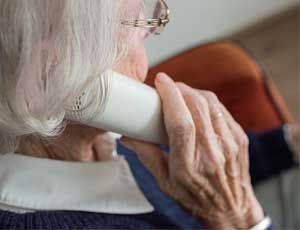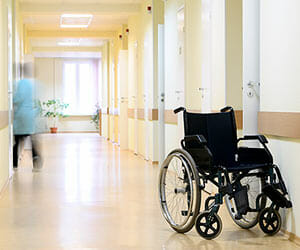Elder Injuries
Older adults experience increased vulnerability to infections or other diseases that accompany a primary illness or physical condition; this is referred to as comorbidity. It describes the decreases in a senior’s immune system that expose them to “secondary” infections
This also combines with their natural increase in physical frailty. Many times an older person’s initial affliction begins with a fall, triggering a chain reaction of health issues that leads to serious threats to their physical – or mental – welfare.
 Seniors who have comorbid conditions – diabetes, arthritis, recovering from major surgeries like hip or knee replacement – can often be predisposed to infections just because they’re older. The body works hard to maintain a strong immune system; but when an elderly person’s body is forced to work harder in one area, other body systems are less robust in warding off other health threats.
Seniors who have comorbid conditions – diabetes, arthritis, recovering from major surgeries like hip or knee replacement – can often be predisposed to infections just because they’re older. The body works hard to maintain a strong immune system; but when an elderly person’s body is forced to work harder in one area, other body systems are less robust in warding off other health threats.
Today, it seems that the elderly swallow more pills than food, thereby making it more difficult for us – and certainly workers at retirement homes and elderly care centers – to keep our senior parents and grandparents as healthy as possible. Their compromised immune systems make fighting off bacterial infections and other diseases much more difficult.
Elder Abuse Just Exacerbates the Already Difficult Lives of our Senior Citizens
A recent national study of elder abuse finds that Kentucky is the fourth worst in the nation when it comes to institutional elderly care. The study – conducted by WalletHub – looked at key areas surrounding elder abuse in general, government resources that monitor and remedy alleged abuse, and the level of protection vulnerable elderly patients receive.
Prominent in Kentucky’s No. 47 ranking is the fact that it also sits near the bottom for the number of gross neglect and exploitation complaints category. Neighboring Tennessee ranks much better, with its cumulative 15th place in the survey. Across the river in West Virginia, they came in 15th.
Types of Abuse Found in U.S. and Kentucky Elderly Care Centers
- Physical Abuse may be intentional, such as hitting or pinching, or neglect such as overuse of restraints, and lack of physical care.
- Sexual Abuse includes sexual assault of a patient who cannot express his or her wishes or remains silent from embarrassment or fear of the healthcare worker/abuser.
- Psychological Abuse is hard to identify, but can involve yelling, humiliating or shaming the patient.
- Financial Exploitation involves a caregiver who steals or compromises the patient’s financial status. This can include physical theft, embezzling patient banking accounts, or applying for credit in the patient’s name.
- Neglect is the most common violation of an elderly patient, often unintentional and usually the product of inadequate or improper staffing. Evidence of neglect can include low patient personal hygiene care; not receiving adequate food, clothing or water; and the presence of bed sores, skin infections, malnutrition and/or dehydration.
- Resident to Resident Abuse may be physical, sexual or psychological.
Clues to Elderly Care Abuse
Though the list is extensive, the most common examples include:
- Broken bones or fractures
- Bruises, cuts or welts
- Bed sores
- Frequent infections
- Signs of dehydration
- Mood swings and emotional outbursts
- Reclusiveness or refusal to speak
- Refusal to eat or take medication
- Unexplained weight loss
- Disheveled or unclean appearance
- Changes in mental status
- Caregivers avoid leaving the patient alone with others.
Not every elderly patient who exhibits these symptoms is the target of nursing home abuse, but the above signs should raise an alarm in family members.
According to the U.S. Census Bureau, the number of Americans age 65 years and older is expected to just about double, to almost 84 million, by 2050. The WalletHub survey estimates that five million senior Americans deal with some sort of physical, emotional or fiscal abuse and about 96 percent of those cases go unreported.
The Bigger Picture Influences the Smaller Picture – Your Family Member
Adult Protective Services (APS) and other agencies usually respond when elderly abuse is discovered, including the Offices of the Inspector General and the Kentucky Attorney General. But the government is primarily looking for criminal violations, not civil – which involves redressing damages actually suffered by elderly victims of institutional abuse. Another problem with relying solely on a governmental approach is that these agencies have limited staff and resources to deal with complaints. This is especially true when considering there are around 25,000 residents in well over 350 nursing homes and elderly care centers throughout Kentucky. To say the government is overwhelmed could be putting it mildly.
 We’ve learned from a recent study conducted by the U.S. General Accountability Office that state regulators are much more likely to miss signs of abuse. The GAO found that 70 percent of state surveys missed significant deficiencies and 15 percent missed notice of actual harm or immediate jeopardy of a nursing home resident. This was just the latest in a long line of reports that reveal deep cracks in state governments’ ability to protect our senior citizens. State legislatures in all 50 states have passed anti-elder-abuse laws. And yet, nursing home abuse still continues – seemingly unabated.
We’ve learned from a recent study conducted by the U.S. General Accountability Office that state regulators are much more likely to miss signs of abuse. The GAO found that 70 percent of state surveys missed significant deficiencies and 15 percent missed notice of actual harm or immediate jeopardy of a nursing home resident. This was just the latest in a long line of reports that reveal deep cracks in state governments’ ability to protect our senior citizens. State legislatures in all 50 states have passed anti-elder-abuse laws. And yet, nursing home abuse still continues – seemingly unabated.
If you suspect that your elderly loved one has been neglected, abused, or injured while in the care of a nursing home or other healthcare facility, please contact Pikeville, KY, nursing home abuse lawyer Billy Johnson by calling 606-437-4488 toll-free or by filling out our online form.



 William “Billy” Johnson grew up in the Dorton area of Pike County, Kentucky, and early on decided to stay in the beautiful Appalachian mountains. Like many others in Eastern Kentucky, Billy’s dad worked as a coal miner, a hard job but one that taught his son how to meet challenges head on and persevere. Attorney Billy Johnson has years of experience helping injured clients with claims such as car, truck, and motorcycle accidents, wrongful deaths, work injuries, and more. [
William “Billy” Johnson grew up in the Dorton area of Pike County, Kentucky, and early on decided to stay in the beautiful Appalachian mountains. Like many others in Eastern Kentucky, Billy’s dad worked as a coal miner, a hard job but one that taught his son how to meet challenges head on and persevere. Attorney Billy Johnson has years of experience helping injured clients with claims such as car, truck, and motorcycle accidents, wrongful deaths, work injuries, and more. [ 



